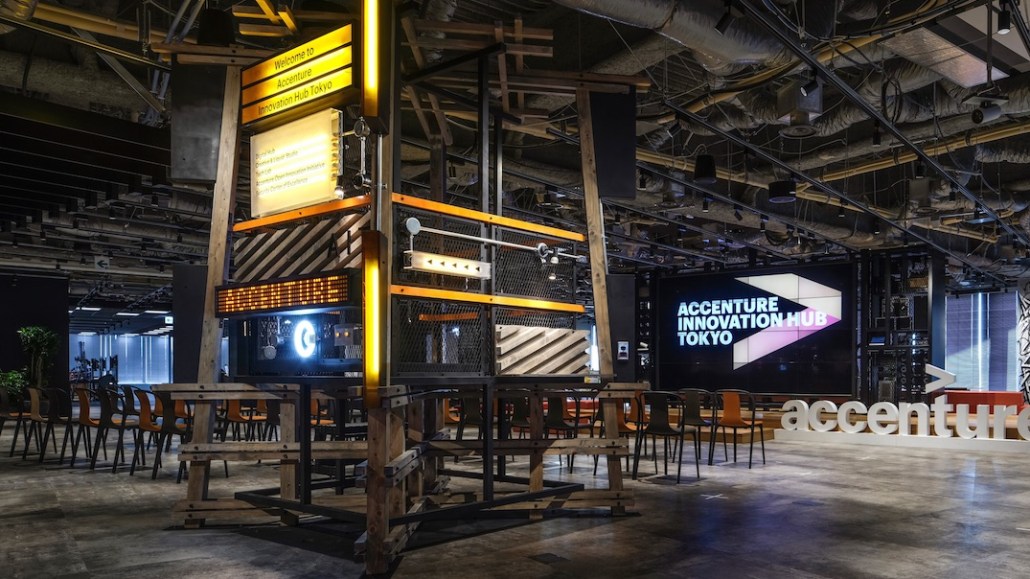Secure your place at the Digiday Media Buying Summit in Nashville, March 2-4

Last week, Accenture opened its new Accenture Innovation Hub Tokyo, which the agency said will foster its use of technology as it plans to increase its “innovation” offering.
The office was unveiled at a news conference. The sizable two-floor space aims to provide employees everything they need to accomplish anything from design thinking to prototype development — from ideation to actual development of products and technologies — and features a swanky cafe, a co-working space to encourage collaboration and a Japanese-style room designed to inspire creativity.
“We wanted to make a large-scale facility in Japan that is on par with Accenture’s other digital hubs around the globe. Our Tokyo hub accomplishes this goal,” said Atsushi Egawa, country managing director for Accenture Japan, at the start of the presentation.
The festival neighborhood of Azabujuban
The new hub is located on the eighth and ninth floors of the Sumitomo Fudosan Azabujuban Building in the Azabujuban neighborhood of Tokyo, an area next to the popular Roppongi district that offers glimpses into traditional Japan. Past the entrance to the hub on the eighth floor, a towering construction in the center of the room dominates the office.
“Azabujuban is famous for its summer festival, and so we wanted the space to reflect that. The tower takes inspiration from the tower built for the festival, and the booths are reminiscent of festival food stalls. There are over 20 booths, each focused on a different theme or technology, like customer experience, AR/VR and RFID,” said Yoshinori Tachibana, supervisor of the Accenture Innovation Hub Tokyo and vp of digital consulting.
For the presentation, 27 booths were set up and divided into zones, such as an industry zone focused on health care and manufacturing, an artificial intelligence zone (a field Accenture is concentrating on) and a virtual shop zone that closely resembles an online store. In-process projects will rotate in and out of these booths, and the booths themselves will be kept in the garage area when not in use.



Accenture first announced the new facility in May 2017, and the hub is supposed to be an embodiment of Accenture’s Innovation Architecture, a companywide program providing comprehensive support for innovation. The program is composed of several divisions: Accenture Ventures, which promotes open innovation; Accenture Labs, which are devoted to applied research and development; Accenture Studios, which design, research and prototype digital services; and Accenture Innovation Centers, which act as hubs for testing solutions.
The street and the home
The two floors of the facility serve separate purposes, with the eighth floor intended to encourage collaboration and new ideas and the ninth floor to turn these ideas into new services and products. The eighth floor is a hub where a variety of outside parties, including big companies, startups, research centers and government and academic institutions, can collaborate. The ninth floor acts as a lab and studio where digital creative production is possible.
Junichiro Kurokawa, Japan lead for Accenture Interactive and Digital Consulting, said he visited Accenture’s digital hubs and innovation centers around the world when coming up with ideas for the lab and designing the office. What he decided on was the Japan-friendly concept of “the street vs. the home.”
“The eighth floor acts like a street, a place where various ideas can come together. The ninth floor is the home, where we have our creators, UI/UX designers and experts in AI and other fields,” he said. “Something that is unique here is that we even have clients stay here to work. Projects each get a separate room, each of which is outfitted to accomplish creative production and prototype development in a span of three months.”
Booths are set up like food stalls and can be arranged differently depending on project, like the RFID and Dfree booths.
The ninth floor is also home to IMJ, a company that Accenture purchased in April 2016 and made a wholly owned subsidiary in December 2017. “Having them on the same floor means we’ll be able to work more closely together,” said Egawa.
Collaborative creation
Other consulting firms are strengthening their abilities to function as digital agencies and hubs for innovation, like Boston Consulting Group’s Digital Ventures, Deloitte Digital and PwC, which opened an Experience Center in November 2017.
With many different companies in Japan — consulting and non-consulting businesses alike — actively launching new open innovation facilities and technology accelerators for fostering startups, there is a lot of competition. Accenture is looking to put its strengths to the test.
Tachibana said one unique aspect that sets the Tokyo innovation hub apart is its ability to offer “collaboration.” “Our company doesn’t actually develop technologies or products, so it’s our job to bring companies that have good technology together,” he said. “By breaking down barriers and being an effective matchmaker, we can create innovation that is possible only in Japan.”
This article originally appeared on Digiday Japan. Translation by Jason Morgan.
More in Marketing

Future of Marketing Briefing: AI’s branding problem is why marketers keep it off the label
The reputational downside is clearer than the branding upside, which makes discretion the safer strategy.

While holdcos build ‘death stars of content,’ indie creative agencies take alternative routes
Indie agencies and the holding company sector were once bound together. The Super Bowl and WPP’s latest remodeling plans show they’re heading in different directions.

How Boll & Branch leverages AI for operational and creative tasks
Boll & Branch first and foremost uses AI to manage workflows across teams.








